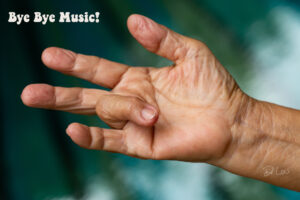How often do Trigger Finger surgeries have complications for the patient?
Trigger fingers affect musicians often. Depending on the finger affected, they can end careers or alter them dramatically. Especially for musicians who play stringed instruments. Some procedures offer very low risk results, others not so much. Yes, trigger finger problems can ruin your career but so could the surgery. Before you go under the knife, weigh your risk factors and make a decision based on the facts, as a matter of “informed consent.”
The failure rate of trigger finger surgery varies depending on the type of surgical procedure performed—open surgery or percutaneous release—and specific patient factors such as underlying health conditions like diabetes.

1. Open Trigger Finger Release:
– The overall complication rate for open trigger finger release is reported to be between 1% and 43%, with major complications requiring reoperation at about 2.4%[1].
– Another study mentions a recurrence rate of 3%, with only a single patient requiring reoperation, indicating a low failure rate[7].
– An office-based study reported a low complication rate with the most common issue being wound complications at a rate of 3.2%[8].
2. Percutaneous Trigger Finger Release:
– The success rates for percutaneous release range from 74% to 94%, suggesting a failure rate of 6% to 26%[6].
– Specific complications such as tendon rupture and recurrence were noted, with recurrence rates increasing over time—5 recurrences at the end of the first year and 9 by the third year[2].
– Another study noted that the primary release failure rate was 4%, and the revision failure rate was 10%[3].
3. Alternatives to surgery
– Alternatives to surgery exist, and for some, are quite effective. From acupuncture, to therapeutic ultrasound to physical therapy. As a general rule, try the least invasive potential solution first, and work your way up to the most invasive, highest risk procedure.
In summary, the failure rate of trigger finger surgery can be inferred to be relatively low, particularly for open surgery, with specific rates depending on the type of surgery and patient-specific factors. Open surgery tends to have a lower failure rate compared to percutaneous release, which has a wider range of failure rates due to its less invasive nature and associated risks of incomplete release and recurrence[1][2][3][6][7][8].
Dr. Lou Jacobs has been specializing in the injuries and health of musicians of all levels for over 22 years. From Grammy winning artists to local porch pickers, Dr. Lou has more experience than anyone else in Maine when it comes to the health needs of musicians. Dr. Lou is a chiropractor, acupuncturist, and unreluctant referral source to medical doctors when a situation is beyond what he is capable of dealing with. The music must go on. Dr. Lou consults with musicians from all over the world online, and may be reached via email directly at drj@drloujacobs.com
Citations:
[1] https://www.ncbi.nlm.nih.gov/pmc/articles/PMC4447687/
[2] https://www.ncbi.nlm.nih.gov/pmc/articles/PMC6485534/
[3] https://www.sciencedirect.com/science/article/abs/pii/S0363502306008148
[4] https://journals.lww.com/plasreconsurg/abstract/2020/10000/increased_rate_of_complications_following_trigger.18.aspx
[5] https://www.webmd.com/rheumatoid-arthritis/trigger-finger-surgery
[6] https://journals.lww.com/prsgo/fulltext/2019/08000/a_critical_appraisal_of_adult_trigger_finger_.18.aspx
[7] https://www.jhandsurg.org/article/S0363-5023%2805%2980195-9/pdf
[8] https://www.jhsgo.org/article/S2589-5141%2822%2900009-3/fulltext
